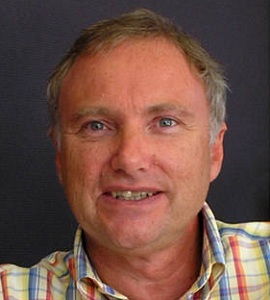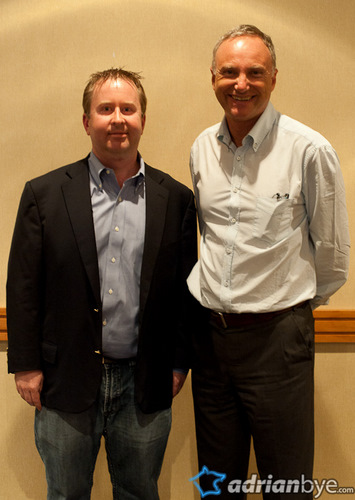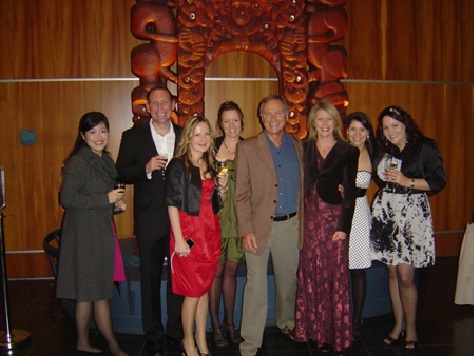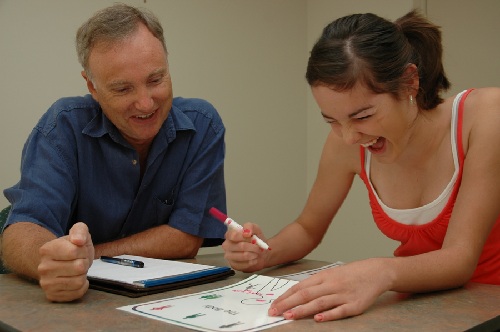- How To Handle A Person With Aspergers Syndrome At Work
- Hear Tony Attwood’s Thoughts On Asperger Syndrome
- What Does Tony Attwood Think About Mirror Neurons?
Full Interview Audio

Personal Info
Sports Teams:Liverpool (UK Soccer Team)
Favourite Books:
- Harry Potter and the Sorcerer’s Stone by J.K. Rowling
- The Vault by Ruth Rendell
- A Taste for Death by PD James
Most Influenced By:Grandparents, People With Aspergers And Autism, Brian Wilson From The Beach Boys, Wife And 3 Children
Company Website: http://www.tonyattwood.com.au
Relevant Link: http://www.youtube.com/user/TheAnMish#p/u/2/QKQeqVxh1VM
Interview Highlights
This is a condensed, lightly edited transcript of an audio interview. The full audio is available and highly recommended. The interviewee may post clarifications in the comments.
Adrian Bye: Today I am here with Tony Attwood. Tony has written the top-selling book on Asperger’s 
Syndrome. Tony, thanks for joining us.
Tony Attwood: Thanks Adrian, I am delighted to be able to talk.
Adrian Bye: What I really wanted to ask you about firstly is can you tell us about your photography?
Tony Attwood: I have always enjoyed capturing the moment, people, scenes, whatever; and if I had more
time I would do photography, not in a professional sense, but for pure enjoyment.
Adrian Bye: Can you tell us a little bit about where you have come from? I talked with Simon Baron-
Cohen about this last week; both of you studied under Uta Frith in the UK.
Tony Attwood: At 19, I was a volunteer at a special school and I met two autistic children. I decided that is
where I am going to go, I’m going to one day become an expert in autism to help these children. I did my
clinical training Ph.D. with Uta Frith, and Simon Baron-Cohen was one of her students at the same time,
so it was a wonderful opportunity to be there at the beginning of many of the great theories of autism.
Adrian Bye: Can you tell me the difference between a psychiatrist or even an academic
and a psychologist?
Tony Attwood: A psychiatrist is someone who has done training in medicine so they know how to
diagnose appendicitis and things like that. A psychologist has studied psychology since undergraduate
level and has specialised in various branches. I am a clinician in the sense that I see people with autism
spectrum disorders for diagnosis and for treatment.
Adrian Bye: I had a very interesting interview with a researcher at Columbia University here at New York
and he said that they have 10-15% that actually leave the spectrum; they call them bloomers. He said
that they have run the data in a lot of different ways and there is something like a 50% lift that they are
seeing which they haven’t been able to account for. What would your thoughts be on that?
Tony Attwood: As a clinician I would endorse that. There are individuals I have seen that I have actually
removed the diagnosis from. One person was about seven and I saw recently him when he was about
21, and the clinical picture has changed; I officially crossed out the diagnosis. If you do a diagnostic
criteria on him today he would fulfil those criteria.
They may also have a successful career; and I think that is one of the most successful indicators of 
successful outcome is a good job. They might also have colleagues; they may have family members or a
partner. So the outcome isn’t always as it was previously thought, that this person will have a constant
level of impairment.
Adrian Bye: In your book you close with a story of the child who was diagnosed in the beginning and at
the end he is the kind of dishevelled engineer who does pretty well driving his nice car and marries the
single mother with two kids. Would you still agree with that as a typical or great outcome?
Tony Attwood: It is true it is a possible outcome, but it illustrates a number of components within that little
story: that he has found the right job in engineering, and people now appreciate him for his intelligence
and problem-solving, not his ability to crack jokes. He has also found someone who was understanding of
him and compassionate; often those with Asperger’s are late developers in terms of relationships.
Adrian Bye: My feeling is that we should be able to take these guys further.
Tony Attwood: When I work with those with Asperger’s I’m trying to encourage them to accept who they
are; to be what I call a first-rate aspie, not a second-rate neurotypical. I say to that person, I would rather
help you explain yourself to others so they will know why you do things that are confusing or abrasive and
accept that you do that rather than expect you to be like everyone else.
Adrian Bye: What you think about the list in terms of diagnoses, do you agree with that?
Tony Attwood: When we look at autism spectrum disorders we know that there are a number of factors
that are associated. One of the ones that is becoming much clearer is in terms of it being associated with
older parents. In modern society people are starting to consider children in their 30s when they get their
qualifications and may not realize that that tends to be associated with a greater risk of autism spectrum
disorders.
Adrian Bye: Your thoughts as to why it would be increasing?
Tony Attwood: I don’t think there is going to be one factor. We have also known that there are
environmental factors and there may be particular toxins, or something that occurs in utero that affects
the development of the brain. There may be something that is occurring in our modern society in a toxic
effect that is affecting children.
Adrian Bye: A topic that I have been pretty interested in lately is mirror neurons. What are your thoughts
on that?
Tony Attwood: An interesting topic, it needs further research. It is that ability to absorb what somebody
else is going through in terms of movement skills but also in terms of emotions. Whether your own
circuitries spark off to duplicate those feelings of those thoughts and those actions, I think is something
that needs further research.
Adrian Bye: If that turned out to be correct, that would change a lot of how we view autism. 
Tony Attwood: You have got to be careful in autism because there have been promises of cures for
decades. The family will say if I try this new holding technique or this new injection or this new hyperbaric
chamber or whatever it is that the entrepreneur is promising – but we haven’t found a cure.
Adrian Bye: I’m going to be interviewing Alison Singer who runs the Autism Research
Institute, and their focus is on facts and evidence-based outcomes. Have you heard of them?
Tony Attwood: Yes, and applaud what they do because it has got to be evidence-based. It has got to be
independent. The person who designed whatever it is can’t do it because you can’t be objective in that
situation. What I don’t want is then for there to be a delay before things are brought forward, so I think
there needs to be an adequate scientific system.
Adrian Bye: Have you found anything that you have seen that you think is promising?
Tony Attwood: A lot of my own work is in terms of cognitive behaviour therapy for emotion management.
What has happened is that within autism the autism studies and therapies are usually designed by
neurotypicals. What’s interesting is that there are a number of people with Asperger’s now that are going
into psychology and psychiatry. And I’m hoping that they will then design psychotherapy and treatments
by aspies for aspies.
Adrian Bye: One book I read about empathy they were talking about that they should be just encouraging
those with very high levels of cognitive and affective empathy. What would you say to that?
Tony Attwood: When people look at empathy within Asperger’s, the suggestion is that they lack empathy.
That is a gross insult to people with Asperger’s because they can be some of the kindest people I know.
The person with Asperger’s is not very good at reading subtle body language, so when a neurotypical is
in mild levels of distress there is an anticipation that the person with Asperger’s will respond with affection
or compassion or consoling. I think it is a question of reading the subtle signals.
Adrian Bye: That could point to mirror neurons couldn’t it?
Tony Attwood: It is a possibility, yes. I think some with Asperger’s syndrome and autism have what I call a
sixth sense for emotional atmosphere. In fact some – and I use the metaphor – have developed
behavioural characteristics like a cactus which has a very sharp and prickly exterior to protect a soft and
vulnerable interior. Some with Asperger’s in fact are emotionally very sensitive to emotional atmospheres,
they can sense when somebody is annoyed with them, critical about them or the atmosphere in a group. I
think they are using different channels than the usual one of reading faces or body language.
Adrian Bye: Maybe that sixth sense somehow develops through being in threatening situations; we get
an extra radar or something.
Tony Attwood: I think there is a lot of redundancy in the human neurological system. Those with
Asperger’s can be tuned into their senses – their auditory sensitivity, their olfactory sensitivity – and I think
sometimes they can be tuned into a sixth sense.
Adrian Bye: One of the things that I found very interesting from your books is the emotional thermometer.
Tony Attwood: The idea of a thermometer is a visual mechanism to indicate the severity of the
expression. It is a useful tool to have for someone who may have difficulty in finding the word, its
alexithymia, to precisely define the emotion. I also find it useful for other people to use the thermometer
so that the person with Asperger’s can understand when they have said or done something because they
may not be able to perceive those subtle qualities.
Adrian Bye: My feeling is that people on the spectrum are generally living at a much higher level of stress
than everyone else anyway.
Tony Attwood: Undoubtedly, and sometimes the exhaustion from that can lead to severe depression and
suicidal thoughts. Solitude is the cure because in solitude you don’t have to relate with anyone. You can
do what you want as long as you like.
Adrian Bye: Do you have many people that end up in acting?
Tony Attwood: A lot, yes. It is a coping mechanism; if you are not very good at socializing just watch them
as another species in a way. Those with ASD can be very good at detail, observing and absorbing the
persona and movements and actions of someone.
There is a gentleman that I know in his 70s with Asperger’s who is a successful theatre actor, and people
used to say to him how do you cope on stage? He said it is relaxing because I know what I’m going to
say, I know what is going to occur, I can relax in that situation. But many teenagers with Asperger’s say it
is as though I am in a play; all the other teenagers know the script but I don’t have that.
Adrian Bye: You had an interesting concept; you talk about super NTs, do you see lots of aspies marrying
Super NTs?
Tony Attwood: I call them extreme neurotypicals rather than super NTs. They are a group of people who
are very talented in understanding the thoughts and feelings perspective of others, so they can get into
the aspie mindset. Some teachers will say if you haven’t got any friends you should just try harder,
whereas the extreme neurotypical teacher will say it’s not just trying harder, he is actually confused and
needs guidance.
Adrian Bye: What about if someone has an employee who they suspect may be on this spectrum or a co-
worker or something like that, how would you suggest handling that situation?
Tony Attwood: That is an interesting question because I can guarantee that those who are reading or
listening to this will know someone not only as a neighbour or someone they knew at school but
somebody in their workforce.
There are a number of factors: first of all don’t ridicule, don’t reject, try to understand. The chances are
that they are going to be exceptionally good at at problem solving, but they can be abrasive to others by
being too forthright and not into the teamwork, not into the bonding, not into the group type things.
And not to push somebody into areas that they feel uncomfortable with; and giving them a bit of guidance
in some of the social situations and what is required. Also making sure that others do not gossip about
that person and acting as their advocate at times to say he may not give you much eye contact but what
he is doing is he’s looking away to really concentrate on what you are saying. As far as he’s concerned
he’s interested in the problem that you are presenting to him and he is trying to think of a solution. The
fact that he doesn’t give you eye contact is irrelevant to solving the problem.
Adrian Bye: So, you are suggesting similar things that we are talking about within personal relationships,
you could almost apply some of that in business as well.
Tony Attwood: Indeed, because those with Asperger’s have particular talents. I mean some of them can
be phenomenal entrepreneurs in the information technology area – but I’m not going to go into diagnoses
of various famous people. They can have a degree of originality, of single-minded determination and an
ability to be creative in a way that others will say “thinking outside the box”, and those with Asperger’s will
say, “what box”?
If you look after your aspies they can be extraordinarily loyal, helpful, determined, but their downfall may
be in the interpersonal side, in which case the team or the group of people that they are working with
need to understand. One of the issues that can occur with Asperger’s is the difficulty when they are
promoted or transferred to management. That is a totally different area to what they may have entered in
terms of problem solving and product design, but now they are responsible for a team. And that is office
politics, it is egos, it is upsetting people.
Adrian Bye: What you are describing is the Peter Principle, are you familiar with that?
Tony Attwood: Yes, of being promoted to the state of incompetence. That is the problem because they
are so good we will make them in charge of this department. They’re not going to cope with that because
people come to them with their personal problems and they want to solve practical problems.









